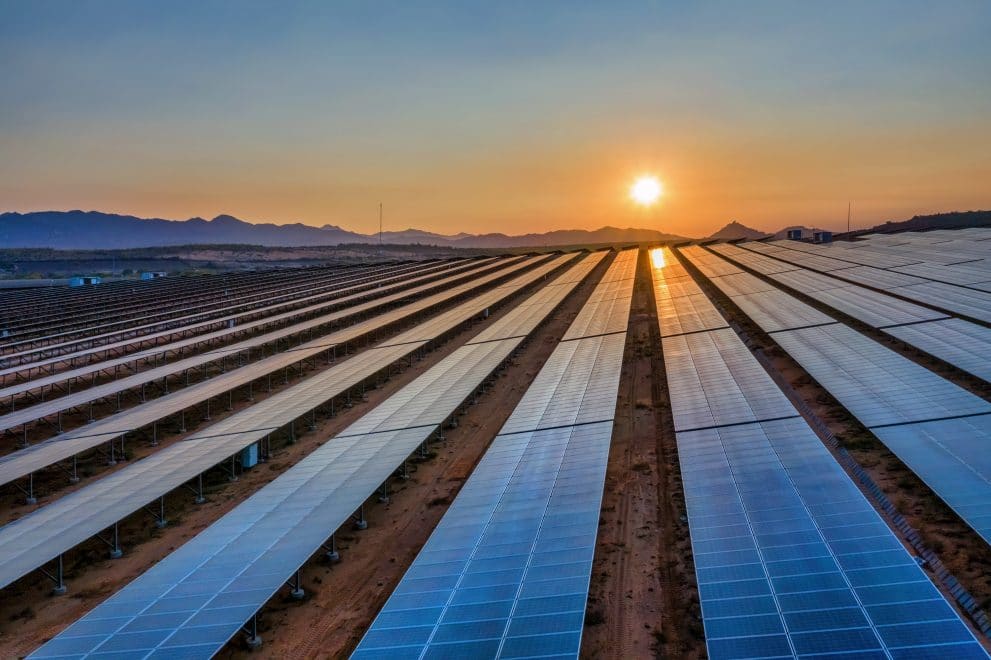
The solar investment landscape in Canada has had its ups and downs over the decades and many of the names that might have appeared on this list ten years ago are either no longer in business or have been swallowed up by other companies. Start-ups burn bright and die off, government interest in renewables changes with the political winds and markets move on to new sectors.
Those dynamics were clearly in play over the past few years where solar, wind and renewable energy stocks went through the roof as countries the world over started revamping their energy grids in earnest and investors both retail and institutional put more focus on the ESG (environmental, social and governance) components in their portfolios.
But the shine wore off earlier in 2021 after the sector hit its peak around February. Call it a case of too much too soon or put some of the blame on a stalled government infrastructure bill in the United States; either way, stocks fell hard with some losing over half of their value in a matter of months.
Short-term trends aside, though, solar energy is no doubt here to stay and its role in our energy supply is only going to become more prominent as countries strive to make good on their climate promises. Those zero emission by 2050 targets have to be met somehow, and it’s that line of thinking that’s led many an investor to renewable energy stocks and ETF’s in general and solar companies in particular.
Here, Cantech Letter gives you ten names from the Canadian perspective, ranked by market capitalization.
As a note, we’ll begin with three companies operating as multi-faceted renewable power companies in the generation and transmission spaces. These names own and operate various facilities for hydroelectric, wind, solar and other non-fossil fuel options, and while none of them are pure-play solar companies, they do deserve mention for their larger size in comparison to the rest of the solar field where often the focus is more on the tech and manufacturing end of the industry, making these utility-type plays potentially less volatile options for those looking for exposure to Canada’s solar market. Along with the first three companies listed below, other names in this space would include Brookfield Renewable Partners, Transalta Renewables and Innergex Renewable Energy .
1. Algonquin Power & Utilities (Algonquin Power & Utilities Stock Quote, Charts, News, Analysts, Financials TSX:AQN)
Market Cap: $11.7 billion
2020 Revenue: $1.677 billion
Oakville, Ontario-headquartered Algonquin Power is one of the more well known of Canada’s renewable power companies, having both a regulated services segment with water, electricity and natural gas utility services and a renewable power generation segment which owns and operates hydroelectric, wind, solar and thermal facilities. The company has currently $6.8 billion in regulated utility assets and $4.0 billion in non-regulated assets with 1.5 GW of renewable generating capacity. Important for investors, the vast majority of that renewable energy business (85 per cent) is wrapped up in long-term contracts.
Algonquin has been advancing on its Greening the Fleet initiative of transitioning its power generation completely to renewables and is currently buying up power generation facilities and companies, including coal-fired plants with the aim of greening them as well. With facilities in places like Nevada, Maryland and Virginia, solar currently makes up a smaller portion of Algonquin’s electricity generation capacity at 258 MW in 2020 compared to 1,496 MW in natural gas and 1,302 in wind.
Algonquin’s share price has bounced around since the start of the pandemic and hasn’t really gained ground over that time span, but the stock comes with a solid 4.8 per cent dividend yield and Algonquin has been active in growing its business on the M&A front.
Portfolio manager Varun Anand commented on Algonquin’s recent purchase of Kentucky Power in the US, saying there’s still a lot of room for the company to grow.
“When you look at what Algonquin has done historically where they buy underperforming utilities in the US they improve operations, they improve return on equity and generate more free cash flow to them. They’re just doing the same playbook again,” said Anand of Starlight Capital on a BNN Bloomberg segment.
2. Northland Power (Northland Power Stock Quote, Charts, News, Analysts, Financials TSX:NPI)
Market Cap: $8.6 billion
2020 Revenue: $2.061 billion
Another heavyweight in the Canadian lineup is Toronto-based Northland, which has 3.2 GW of generating capacity. The company has wind, solar and natural gas power generating facilities and, as of last year, is a newer player in regulated utilities with a Columbian electricity utility serving 480,000 customers. Like Algonquin, solar is at the moment a smaller piece of the puzzle, with most of Northland’s generating capacity coming from wind and natural gas. For solar, Northland has generating facilities in Canada as well as a 130 MW solar plant currently under construction in Mexico and a newly awarded bid to build another 130 MW of solar capacity in Colombia.
Sales were down in Northland’s third quarter, delivered in mid-November, as the company reported poor wind conditions for some of its wind facilities. But the company is still calling for a decade of strong growth, forecasting it will add four to five GW of renewable capacity by 2030.
“Abnormally low wind conditions in the North Sea persisted in the third quarter, resulting in reduced financial contribution from our three large offshore wind facilities. However, consistent with last quarter, we remain on track to meet the low end of our 2021 financial guidance, largely due to the performance of our onshore portfolio as well as the increasing diversification within our operating portfolio, thanks to our Colombian utility, EBSA and the recently acquired solar and wind portfolio in Spain, both of which are performing well,” said Mike Crawley, Northland’s President and CEO in a November press release.
Northland, which also sports a good dividend at a 3.2 per cent yield, was a certified high-flier in 2020 when the stock doubled, but NPI has been giving back some of those gains in 2021 where it’s currently down about 16 per cent.
3. Boralex Inc (Boralex Stock Quote, Charts, News, Analysts, Financials TSX:BLX)
Market Cap: $3.6 billion
2020 Revenue: $619 million
Montreal-based Boralex is the third power company on our list, with renewable energy facilities in wind, hydro, thermal and solar. The company now has installed capacity of 2.5 GW and wind power is its largest contributor, with wind farms across Canada and France, hydroelectric plants across Quebec, BC, Ontario and New York state and solar in Ontario, the US and France. A full 82 per cent of the company’s power generation is in wind, followed by seven per cent in hydro, nine per cent in solar and two per cent in thermal energy sourcing. Geographically, Boralex has about 45 per cent of its facilities in Canada, 43 per cent in France and 12 per cent in the US.
Boralex has put in place a five-year strategy to grow its business both organically and through acquisitions, and that includes solar, where the company earlier this year submitted bids for 800 MW of solar projects in New York. Boralex’s latest quarter featured $126 million in revenue and $81 million in EBITDA with a net loss of $22 million.
As for the stock, Boralex comes with a dividend at currently a 1.8 per cent yield, with BLX having been the definition of range-bound for much of 2021, floating between $35 and $40 and currently trading down 25 per cent year-to-date. That was after a year when the stock returned a massive 93 per cent in 2020.
4. Canadian Solar (Canadian Solar Stock Quote, Charts, News, Analysts, Financials NASDAQ:CSIQ)
Market Cap: $2.0 billion
2020 Revenue: $3.477 billion
Guelph, Ontario-based Canadian Solar are makers of photovoltaic modules and battery storage options along with developing utility-scale solar and battery projects. Having gone public back in 2006, the company’s share price bears witness over the years to the ups and downs of the solar and renewable energy sectors, with interest peaking before the financial crisis in 2008 and again in 2013-14. More recently, CSIQ started climbing in mid-2020 and peaked this past January, going from around $20 to as high as $60 per share. The stock has since been falling and is now around the mid-$30s.
Operationally, Canadian Solar is continuing to sell its solar modules despite ongoing worldwide supply chain issues as well as increasing costs of materials while the company is putting more effort into growing its battery storage segment, including the company’s first stand-alone battery storage project in California, a 350 MW project under construction.
By the numbers, Canadian Solar’s latest quarter has it generating $1.23 billion in revenue, up 34 per cent year-over-year, with a gross margin of 18.6 per cent which was well above management’s prior guidance of 14 to 16 per cent. Net income was $35 million or $0.52 per share.
“We delivered our strongest quarterly performance since the start of COVID,” said Shawn Qu, Canadian Solar’s Chairman and CEO, in the company’s third quarter 2021 press release on November 18. “While operational challenges have intensified recently, emerging energy crises across the world underscore the urgency to accelerate the deployment of clean, renewable energy paired with reliable battery storage technology.”
“We continue to invest in the research and development of competitive solar and battery storage system solutions and in expanding our global sales channels,” he said.
On its growth plans, Canadian Solar recently completed an offer of 3.6 million shares to raise $150 million, with management saying the proceeds will go towards developing it battery storage business, growing its storage pipeline of business and for potential M&A activity.
5. 5N Plus (5N Plus Stock Quote, Charts, News, Analysts, Financials TSXV:VNP)
Market Cap: $194 million
2020 Revenue: $177 million
5N Plus is a high-purity metals and compounds producer based in Saint-Laurent, Quebec, with connections to the solar industry through supplying semiconductor materials related to thin-film photovoltaic (PV) modules. The company has multi-year contracts with Arizona-based First Solar with whom it has been working for over a decade. Along with its Eco-Friendly Materials business 5N has an Electronic Materials segment, with the company announcing earlier this year a long-term supply agreement with Samsung for semiconductor materials for next generation medical imaging devices.
Overall, 5N is seeing increases in its business, reporting 28 per cent revenue growth to $50.8 million in its latest quarter, driven by its Eco-Friendly Materials segment. Management underlined in the quarterly announcement that global supply chain challenges has been a factor in increased costs which have impacted the company’s bottom line.
5N recently completed the acquisition of German solar cell manufacturer AZUR SPACE Solar Power, a deal which came with a price tag of 74.6 million euros and adds to 5N a business that had at last count over 50 million euros in annual revenue and about six million euros in EBITDA. 5N Plus also recently lost its CEO of the past six years in Arjan Roshan, with an interim CEO named as of late November and the search for a new head currently ongoing.
5N’s share price is currently down by half since its $4.75 highs of earlier this year.
6. Eguana Technologies (Eguana Technologies Stock Quote, Charts, News, Analysts, Financials TSXV:EGT)
Market Cap: $150 million
2020 Revenue: $8.0 million
Fast-rising Eguana Technologies is having a catalyst-filled end to 2021, with the Calgary-based energy storage company securing new licensing agreements and orders for its Evolve and Evolve Max energy storage systems. Eguana’s solutions are geared at homeowners and businesses looking to install solar power, with the company’s latest announcement being an order from Alternative Energy Southeast, a Georgia rooftop solar and storage provider in the US. Earlier in November, Eguana announced a partnership with San Jose, California-based Omega EMS to launch a line of energy storage solutions for the North American and Caribbean markets.
“Significant growth is expected for the residential energy storage markets through 2021 and beyond, with a record order book and back log, higher margin products, as well as a diversified battery module supply chain, Eguana is poised to deliver its best results to date,” said Eguana CEO Justin Holland in a press release earlier this year.
A common theme for solar companies in 2021 as it has been for many industries, Eguana faced supply chain disruptions which impacted business, as seen in the company’s fiscal third quarter 2021 results which showed revenue of $1.3 million compared to $1.9 million a year earlier. The Q3 showed an operating loss of $2.7 million compared to a loss of $1.8 million a year earlier.
At the same time, Eguana’s share price has doubled in 2021 on the back of the company’s operational progress as well as strong tailwinds in the residential and commercial solar business overall.
7. UGE International (UGE International Stock Quote, Charts, News, Analysts, Financials TSXV:UGE)
Market Cap: $51 million
2020 Revenue: $1.4 million
UGE International is a solar projects company specializing in installing solar on commercial buildings and parking lots in cities like New York. The company works on a build, own and operate model and has now completed over 700 projects in over 90 countries worldwide.
UGE had an eventful year in 2021 starting with a contract with Central Maine Power for their largest project to date at 5.4 MW, then it signed new leases in Pennsylvania, Maryland and New York City along with new projects in the Philippines. By the end of the third quarter, UGE’s project backlog had grown from 82.3 MW at the close of Q2 to 116.2 MW and management said UGE’s project pipeline grew to 790 MW, up from 358 MW at the end of the previous quarter.
The stock took off over the back end of 2020 and peaked in late January before trailing off since. Currently, UGE is a little under water for the year but at about $1.70 per share, UGE is still up plenty compared to 18 month ago when it was around $0.35.
8. Solar Alliance Energy (Solar Alliance Energy Stock Quote, Charts, News, Analysts, Financials TSXV:SOLR)
Market Cap: $41 million
2020 Revenue: $3.5 million
Micro-cap company Solar Alliance Energy is a solar design, build and install business serving the southeastern US states of Tennessee, Kentucky, North and South Carolina and more recently New York State. The company is both an owner of solar assets from which it derives recurring revenue and a builder for third-party customers.
Solar Alliance posted revenue of US$252,352 for its latest quarter, down from $530,385 a year earlier, but management called the Q3 an inflection point for Solar Alliance due to the opening up of new sales channels which helped bring in some bigger contracts. The stock went from $0.10 to $0.70 in a matter of weeks to start of 2021 but has given back almost all of that ground.
9. Aurora Solar Technologies (Aurora Solar Technologies Stock Quote, Charts, News, Analysts, Financials TSXV:ACU)
Market Cap: $19 million
2020 Revenue: $1.9 million
Vancouver-based Aurora Solar Technologies has hardware and software for process measurement for solar cell fabrication along with services for measurement and control planning and system installation. The company is currently commercializing its Insight data science software, used to improve manufacturing yield in solar cell manufacturing.
In November, Aurora announced an agreement with Shanghai-based IoT company Baibart Intelligent Technology to develop a silicon wafer tracking system to be used with Insight for the larger China market. Aurora plans to have Insight ready for a general market rollout later in 2022.
Earlier this year, portfolio manager Robert McWhirter commented on Aurora, saying the company’s product may be a breakthrough for the solar cell industry, with the company already having lined up over a dozen of the world’s largest solar manufacturers waiting for Insight to finish its testing.
“Instead of just selling one-off equipment, Aurora hopes to set [their product] up as a Software as a Service recurring revenue if so there’ll be a lot more stability and predictability to their contracts and income going forward,” McWhirter said on a BNN Bloomberg segment in April.
“Because making solar cells is almost like running a grocery store, the margins when you’re making the solar cells themselves are tiny. If it turns out Aurora Solar’s product can end up helping you increase the overall efficiency and yield, then it would be quite significant,” McWhirter said.
10. Clear Blue Technologies (Clear Blue Technologies Stock Quote, Charts, News, Analysts, Financials TSXV:CBLU)
Market Cap: $15 million
2020 Revenue: $4 million
Toronto-based Clear Blue Technologies provides off-grid power solutions like solar-powered lighting, security, telecom and IoT devices, employing an “Energy-as-a-Service” model for mission critical infrastructure.
2021 has been a big year for the company, with a huge jump in revenue due in large part to new telecom infrastructure contracts in Africa. Revenue grew by 139 per cent year-over-year in Clear Blue’s most recent quarter, hitting $2.2 million compared to $940,849 a year earlier and compared to $810,406 a quarter earlier.
And management is expecting more to come, with a large order anticipated for early Q1 2022, one which could double the company’s Q3 2021 bookings.
“We have seen an exciting year to date and our trailing twelve month (TTM) numbers clearly reflect our traction with deployments with infrastructure operators in Africa, helping to increase TTM revenue by 131 per cent year-over-year as at Q3,” said Miriam Tuerk, Co-founder & CEO, in a third quarter press release.
Clear Blue’s share price vaulted ahead in late 2020 but has been falling back for most of 2021.
Leave a Reply
You must be logged in to post a comment.





 Share
Share Tweet
Tweet Share
Share




Comment